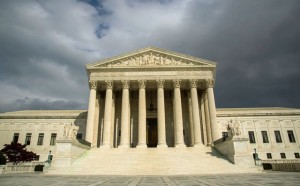From AP:
WASHINGTON (AP) — The Supreme Court will take up California's ban on same-sex marriage, a case that could give the justices the chance to rule on whether gay Americans have the same constitutional right to marry as heterosexuals.
The justices said Friday they will review a federal appeals court ruling that struck down the state's gay marriage ban, though on narrow grounds. The San Francisco-based appeals court said the state could not take away the same-sex marriage right that had been granted by California's Supreme Court.
The court also will decide whether Congress can deprive legally married gay couples of federal benefits otherwise available to married people. A provision of the federal Defense of Marriage Act limits a range of health and pension benefits, as well as favorable tax treatment, to heterosexual couples.
The cases probably will be argued in March, with decisions expected by late June. Full AP story here

Update 1:25 p.m. Interesting entry from SCOTUSblog live analysis:
There is a good deal of complexity in the marriage orders, but the bottom line is this: the Court has offered to rule on Prop. 8 and on DOMA Section 3, but it also has given itself a way not to decide either case. That probably depends upon how eager the Justices are to get to the merits; if they are having trouble getting to 5 on the merits, they may just opt out through one of the procedural devices they have offered up as potentials.
In a conversation with Scott Shafer today, UC Davis law professor Vik Amar addressed this issue:
AMAR: Remember, the Supreme Court today asked the parties to brief another question, which has been looming throughout, and that is whether the sponsors to Prop. 8 are proper parties to defend the measure in federal court. The Supreme Court signaled that his case may go away on standing grounds. And the court may never reach the merits at all, if it’s not convinced that the sponsors are appropriate defendants to the court.
SHAFER: I believe they also asked that question in the DOMA case they took up, that question of standing.
AMAR: They did, because the Obama Administration has declined to defend the DOMA, the federal statute, and in fact agrees with the lower courts that it’s unconstitutional, which led the House of Representatives to hire its own outside lawyers headed by Paul Clement. And the court today wondered aloud, and asked the parties to brief whether Paul Clement and his group is a proper party to defend DOMA. Now that’s even more arresting than them asking whether the Prop. 8 sponsors have standing, because there are a lot of cases in which Congress has been allowed to defend federal statutes where the president has not.
(I)f the justices were to say there is no one to defend Congress’s work product when the president doesn’t, that really opens up the door to broad presidential powers to essentially ignore and thus undermine what Congress does.
Update 1:40 p.m. Another interesting wrinkle...from the Sacramento Bee, Nov 15:
During a chat with The Bee's editorial board Wednesday, Steinberg said he could envision the Democrat-controlled Legislature using its new-found two-thirds majority power to put a gay-marriage referendum on a future statewide ballot.
"Depending upon what the Supreme Court might or might not do with Proposition 8, in coalition with stakeholders and the gay and lesbian leadership, if it were appropriate and necessary to put a repeal of Prop. 8 on the ballot with our two-thirds supermajority, I would be open to that," the Sacramento Democrat said.
In Nov 2008, Californians passed Prop 8 by 52 percent to 48 percent. But a May 2012 PPIC poll found that Californians supported same-sex marriage by 54-40 percent. More on the changing views of Californians on this issue from that poll:
In October 2008, a majority of older Californians opposed same-sex marriage (34% in favor, 58% opposed); they are now closely divided (45% favor, 47% oppose). Support has grown 15 points among younger Californians, age 18–34 (from 53% to 68%). Majorities of both women (53%, up slightly from 47% in 2008) and men (55%, up 13 points) now support same-sex marriage. In their 2008 campaign, Proposition 8 proponents appealed to parents by claiming that if same-sex marriage remained legal, it would be taught in schools. A majority of parents expressed opposition at the time (42% in favor, 54% opposed), but the opinion gap has since narrowed (46% in favor, 47% opposed). Support for same-sex marriage has increased somewhat among whites (from 50% in 2008 to 59% in 2012) and Latinos (from 36% to 43%).
You'll recall that in the November election, Maine voters approved same-sex marriage just a few years after banning it.